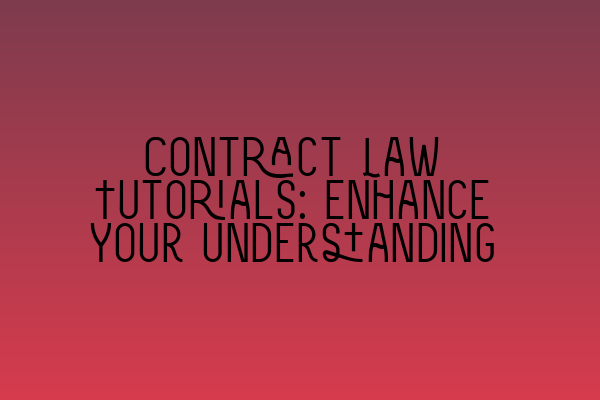Contract Law Tutorials: Enhance Your Understanding
Contract law is the backbone of legal agreements in many areas of business and personal transactions. Whether you are a law student, solicitor, or simply interested in gaining a better understanding of contract law, this tutorial is designed to help you enhance your knowledge in this important field.
Why Contract Law Matters
Contracts form the basis of everyday transactions in both the business and personal realms. Understanding contract law is crucial for legal professionals to navigate the complexities of drafting, negotiating, and enforcing contracts. It is also essential for entrepreneurs and individuals to protect their rights and ensure their agreements are legally binding.
By acquiring a solid understanding of contract law, you can confidently interpret, negotiate, and draft agreements, avoiding costly disputes and legal pitfalls along the way.
Essential Concepts to Master
To fully comprehend contract law, it is important to grasp the fundamental concepts that underpin this legal area. Here are a few key concepts you need to be familiar with:
- Offer and Acceptance: Contracts begin with an offer made by one party and accepted by another. Understanding the requirements for a valid offer and acceptance is crucial in determining whether a contract has been formed.
- Consideration: For a contract to be legally binding, both parties must exchange something of value. This concept of consideration ensures that each party gains some benefit or incurs a detriment in the agreement.
- Intention to Create Legal Relations: Parties must have a mutual intention to be legally bound by the terms of the contract. This concept is important in distinguishing legally enforceable agreements from mere social or domestic arrangements.
- Capacity: Certain individuals, such as minors and individuals lacking mental capacity, may be deemed incapable of entering into contracts. Understanding the rules surrounding capacity is essential in assessing the validity of a contract.
- Consent: Contracts must be entered into freely and voluntarily by all parties involved. Understanding the principles of misrepresentation, mistake, undue influence, and duress will help you determine whether consent was validly given by all parties.
- Terms and Conditions: Clear and unambiguous contract terms are vital for avoiding disputes. Understanding how terms are incorporated into contracts, the difference between conditions and warranties, and the implication of terms will ensure you can draft and interpret contracts accurately.
- Breach and Remedies: When one party fails to fulfill their contractual obligations, a breach occurs. Understanding the remedies available for breach of contract, such as damages, specific performance, and injunctions, is crucial for protecting the rights of aggrieved parties.
How to Enhance Your Understanding of Contract Law
Now that you have a grasp of the essential concepts, it’s time to explore resources and techniques to enhance your understanding of contract law. Here are some valuable tips:
1. Online Tutorials and Courses
There are numerous online tutorials and courses that cater to individuals looking to enhance their knowledge of contract law. These resources offer in-depth explanations, practical examples, and quizzes to test your understanding.
Related Article: The SQE for International Lawyers: A Bridge to British Legal Practice
2. Case Studies and Analysis
Studying real-life contract law cases and analyzing the judgments can provide valuable insights into the application of contract law principles. By reviewing the facts, legal issues, and reasoning behind court decisions, you can deepen your understanding of how contract law operates in practice.
Related Article: Expert Insights: Solicitors in UK Courts – Tips and Strategies for Success
3. Textbooks and Legal Guides
Textbooks and legal guides specifically focused on contract law can provide a comprehensive overview of the subject. These resources often cover essential concepts, landmark cases, and practical tips for drafting and interpreting contracts.
4. Seeking Legal Advice and Mentorship
If you are a law student or aspiring solicitor, seeking mentorship or guidance from experienced legal professionals can greatly enhance your understanding of contract law. Connecting with practitioners who specialize in contract law can provide valuable insights, practical tips, and career guidance.
5. Continued Professional Development
For practicing solicitors, participating in continued professional development (CPD) programs focused on contract law can ensure you stay up-to-date with the latest developments and best practices in this field. CPD programs often offer seminars, webinars, and workshops conducted by experts in contract law.
Conclusion
Contract law is an essential area of legal practice with far-reaching implications for businesses and individuals alike. By enhancing your understanding of key contract law concepts, you can navigate contractual agreements with confidence, avoid legal disputes, and protect your rights.
Continue your learning journey by exploring the related articles below:
LLC Formation Made Simple: Step-by-Step Guide for UK Entrepreneurs
Delaware Corporate Law for UK Solicitors: Key Insights and Practices
Complying with Legal Obligations: Delaware LLCs in the UK
The SQE for International Lawyers: A Bridge to British Legal Practice
Expert Insights: Solicitors in UK Courts – Tips and Strategies for Success
